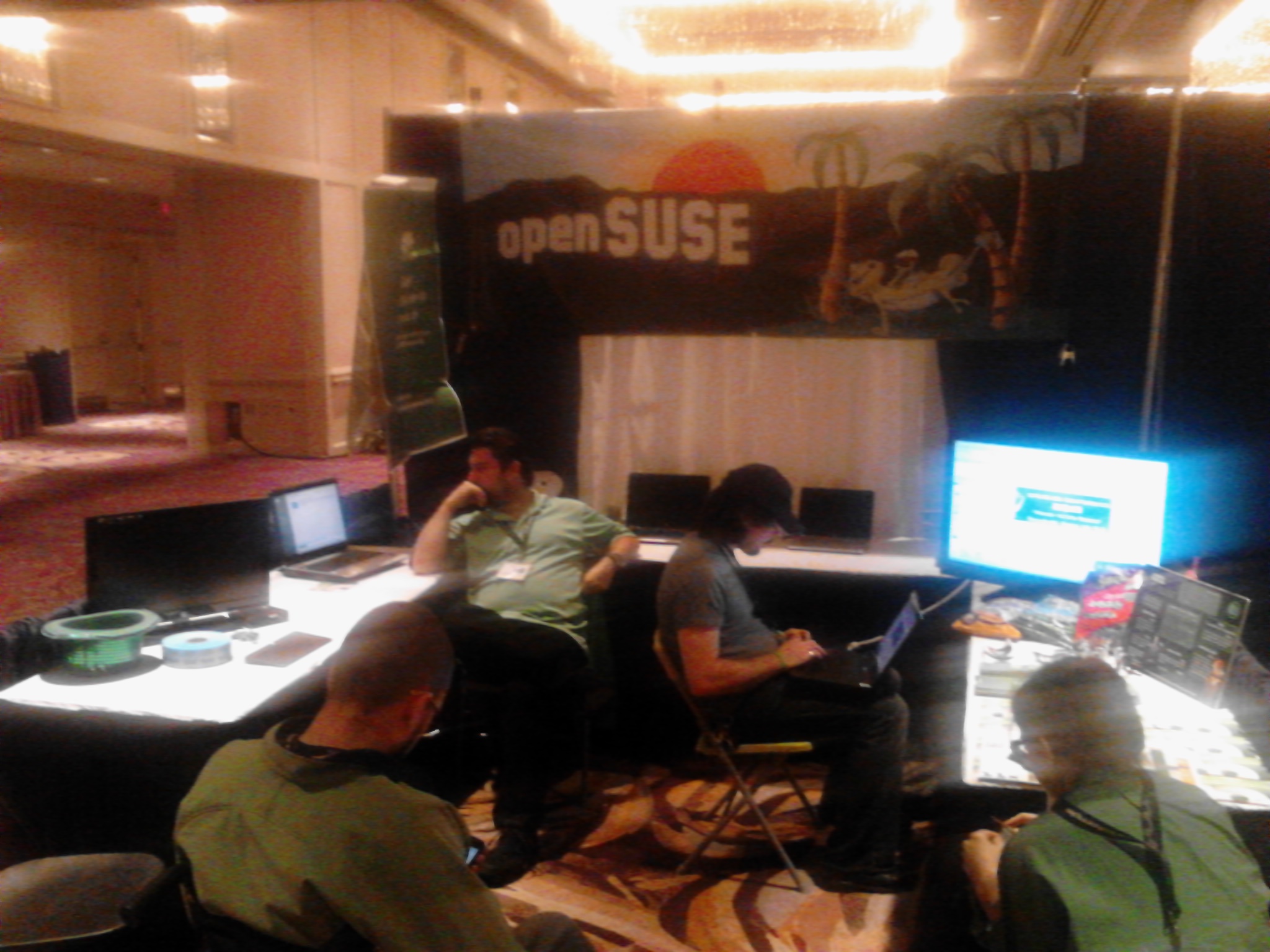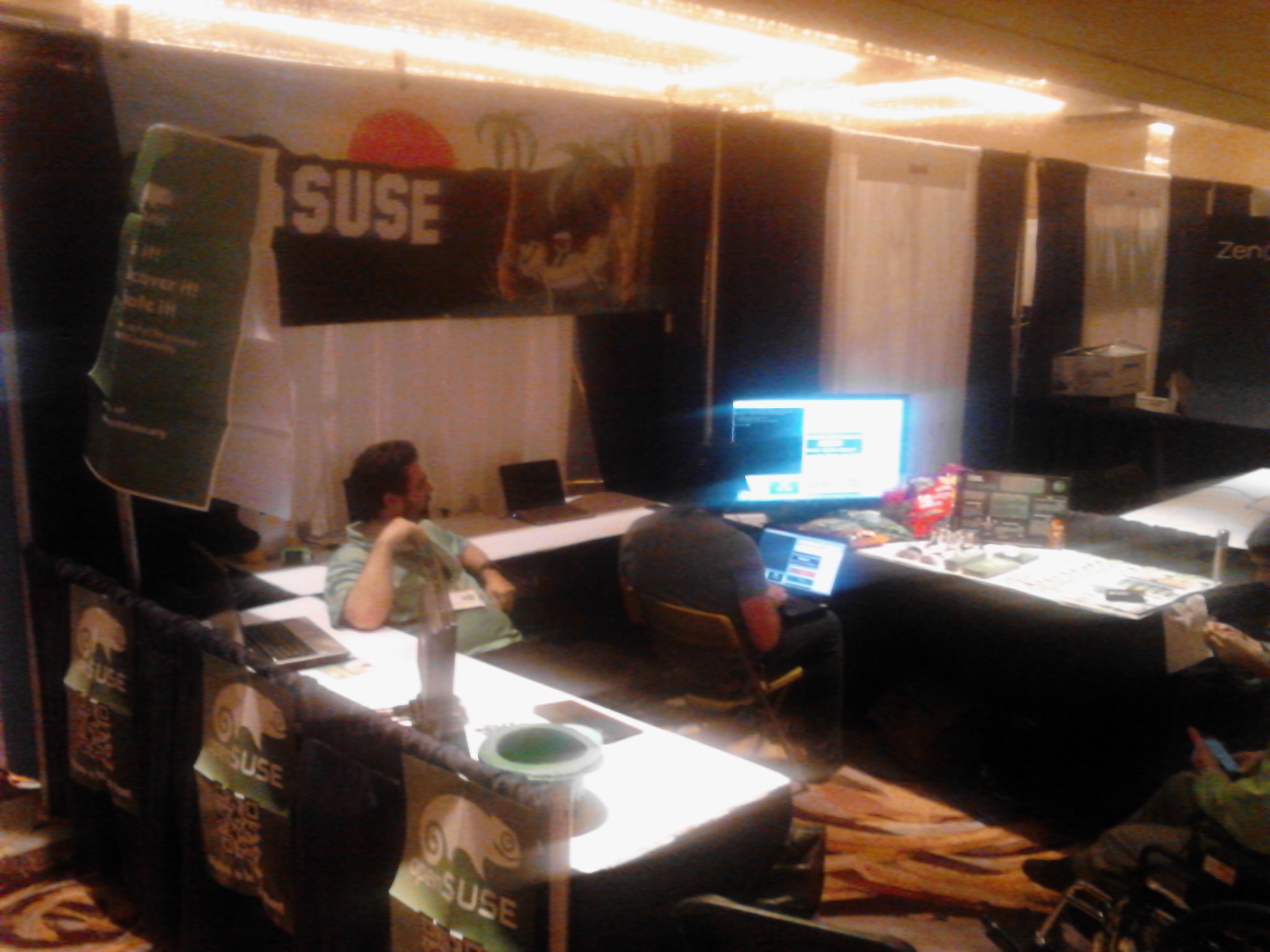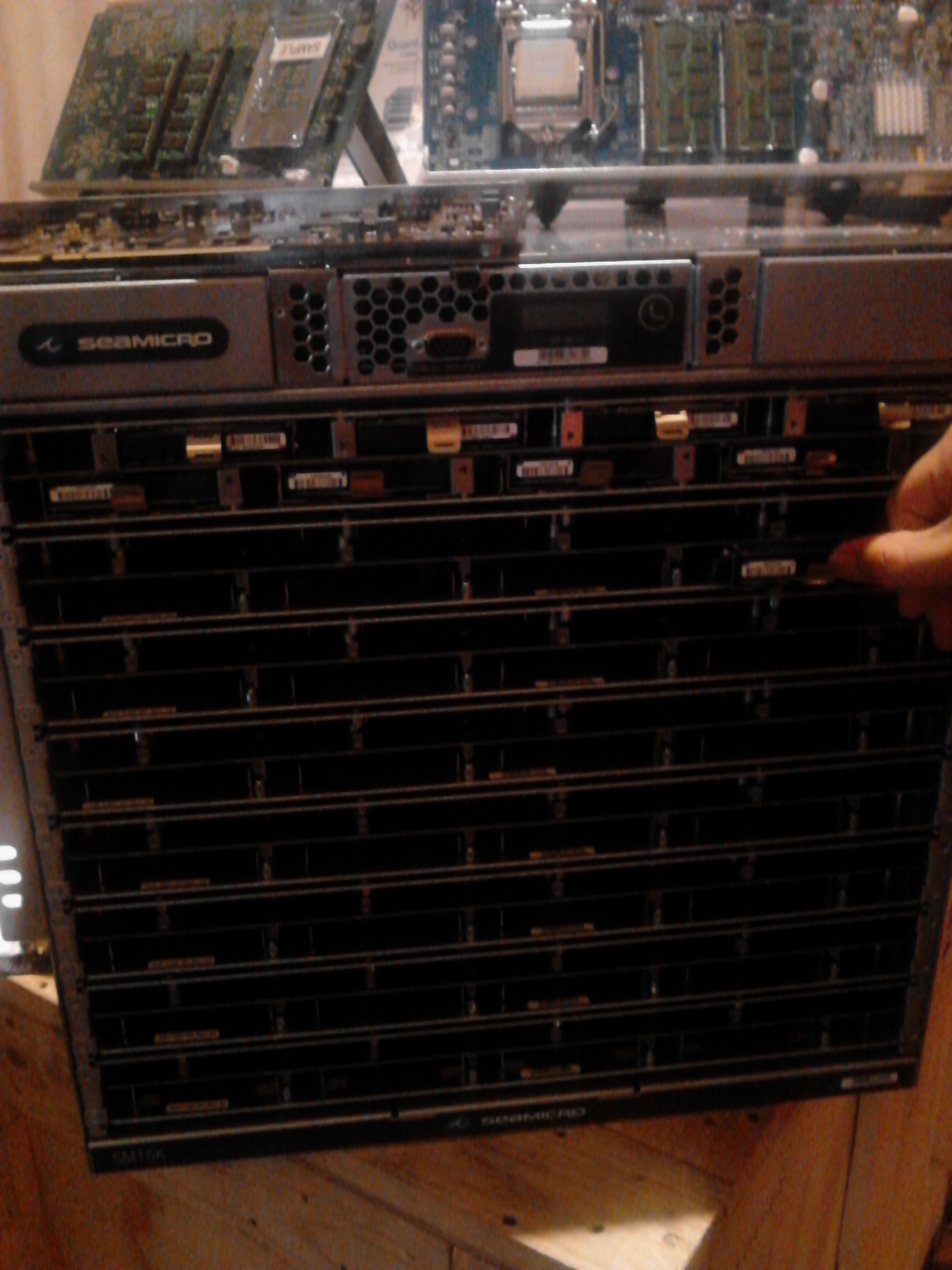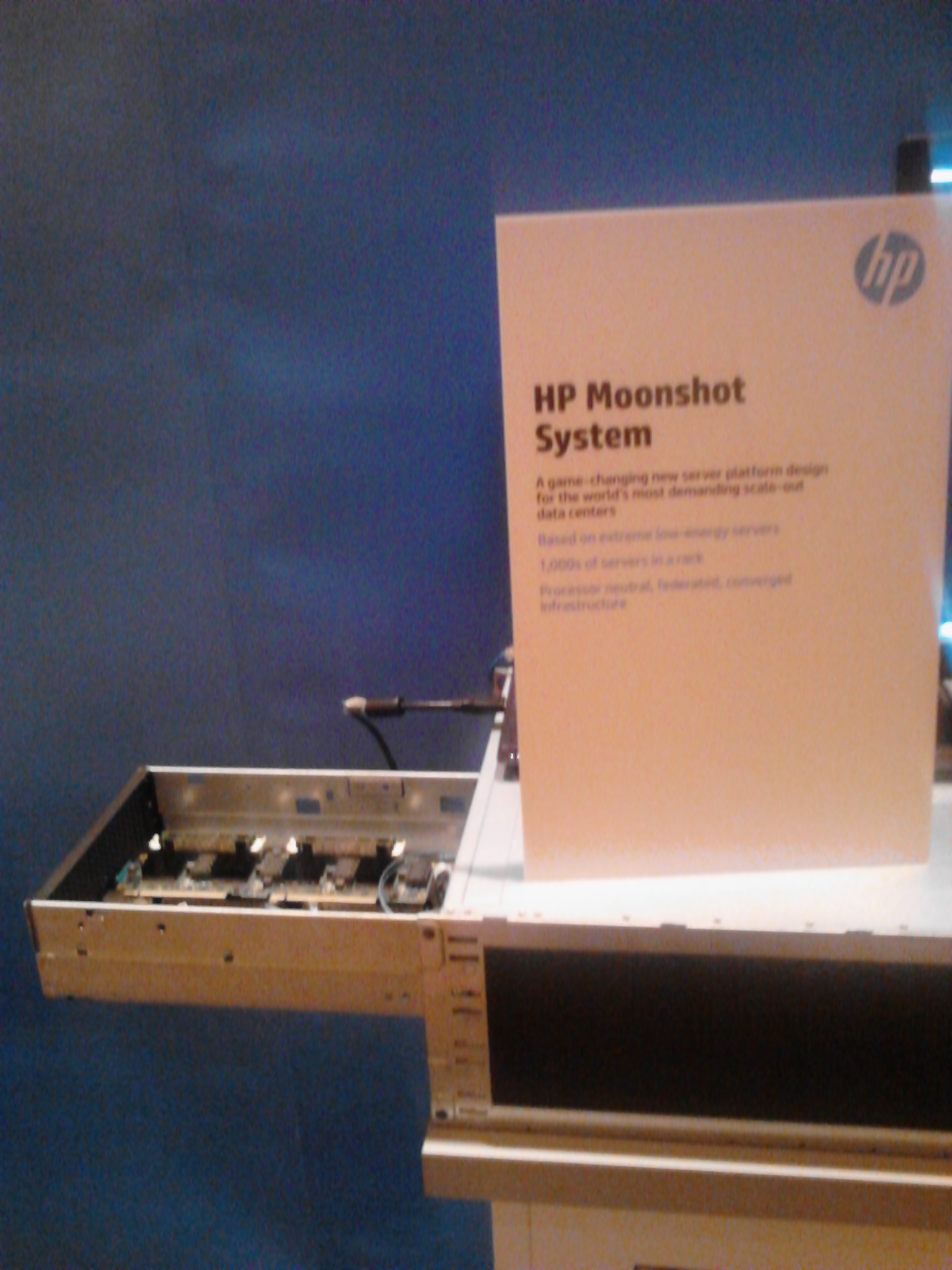User:Tsu2/scale11x
openSUSE at Southern California Linux Expo
| February 22-24, 2013 | ||
Interested in following my openSUSE contributions?
Search my posts in the Technical Help Forums (http://forums.opensuse.org/english)
View slide decks from presentations I have given (http://sites.google.com/site/4techsecrets)
Thank you to the openSUSE Travel team, only because of your support attending SCALE11x was this information discovered, much of which is being contributed back directly through the openSUSE forums.
SCALE11x (2013) was a great success for openSUSE! Despite lack of registered speakers, the openSUSE booth was one of the most popular destinations in the exhibit halls(yes there were so many, exhibits overflowed the first room). It didn't hurt that the openSUSE booth was given a corner location which more than doubled the visual exposure.
I'd also like to compliment the banner makers, it is a great piece of artwork. Not only did it beat what we were using 2 years ago when I last attended SCALE, it was eye-catching and original compared to other booths.
Personally, I found the questions from passersby this year more advanced and interesting than typical events. Sure, there were the newbies who were curious what sets openSUSE apart from other distros, but there was also a good smattering of people who were impressed by OBS, SUSE Studio and other community services we provide.
So, what was big at SCALE this year? There were a lot to choose from with over 100 exhibit booths, hundreds of presentations (there were 13 presentation rooms in use simultaneously almost all of two days and mostly used the third). No matter what your interest, it was probably well represented... There were the usual contemporary hot topics like the Cloud, development and administration... but there were also some unusual twists on common products.
So, for instance I sat a presentation on "Unstructured Data in PostgreSQL." What?! you might say - PostgreSQL is an RDBMS, how could you use it for unstructured data? During that hour I learned that the roots of PostgreSQL were actually in unstructured data and only later table relationships were built on top, so returning to PostgreSQL roots is actually not that big a thing. Then he described some simple performance comparison tests he ran but carefully stating that different tests against different types of data would likely return different results. For the simple tests he ran, PGS was a leading performer so at least initially it could be considered an alternative to other more typical NoSQL databases.
Unstructured Data in PostgreSQL - Christophe Pettus
I sat another session about "Dual Stack Firewalling using IPv6." I thought that'd be interesting, whatever he might mean by dual stack and firewalling. As it turned out there wasn't much discussed about firewalling, but an interesting takeway was a solution to a fairly common problem... openSUSE installs by default with IPv6 turned on and with good reason since the world is moving to adopt it to relieve the exhaustion of IPv4 addresses. But, today there are a large number of NAT devices that support IPv4 but block IPv6. The conventional advice has been to disable IPv6, but within a few years or sooner you may need IPv6 for various reasons. To the rescue is a commonly available free service provided around the world called "tunnel broker." I have posted a recommendation to advise Users to use this instead of disabling IPv6
https://forums.opensuse.org/english/get-technical-help-here/how-faq-forums/unreviewed-how-faq/483599-ipv6-blocked-ipv4-nat.html
Linux as an IPv6 dual stack Firewall - Stuart Sheldon
For anyone who is into Desktop Video Editing, the presentation by the author of OpenShot was popular and interesing... He described a few advantages OpenShot provides such as compiling by frame rather than by track (although of course tracks are displayed). He also demonstrated some new features in the upcoming release next month which includes "Green Screen" chroma editing. Cool! - Now everyone has the ability to create a video placing people and objects in other videos!
Introducing OpenShot Library: A Powerful New Video Editing Framework! - Jonathan Thomas
A very timely presentation I sat was on LXC and namespaces... Timely because I had recently started experimenting with testing ARM images using chroot and a QEMU modified kernel. Although chroot is adequate for simple, highly trusted use, running questionable apps or Commercial Linux Containers requires additional steps to secure and isolate, like running LXC and applying a number of special restrictions. The latest approach replacing the "number of special restrictions" is to use the filesystem namespace. Lightweight Virtualization with namespaces, cgroups, and unioning filesystems - Jérôme Petazzoni
As an experimenter of OpenStack (and anyone who is serious about SUSE and openSUSE cloud also should be) I sat "Building Storage as a Service using OpenStack." Very interesing. Please, please I hope that packaging for SUSE/openSUSE can be accelerated. I like the current packages and appreciate the efforts but waiting more than 3 months for usable packages is too long. I may have to experiment with building from source to get the features described for Grizzly, the next scheduled release.
Building Storage as a Service with OpenStack Cloud - Greg Elkinbard
The Linux/Windows interoperability presentation was very good, but didn't shed any new light on anything I didn't already know. Of course as I write this, the "new" news today is the recent official release of SAMBA 4, but it's too new for anyone to claim expert opinion and otherwise except for the re-incarnation of Likewise the landscape hasn't changed much over the last several years.
Linux and Windows Inter-operability – Making Linux and Windows play nice - Joseph Guarino
The Logstash presentation was very good and expanded on what I'd already known (but not often used). Very cool stuff, showed how it's possible and even necessary to deploy in a very large enterprise to collect, filter, analyze and pipe log data from many monitored nodes to various display apps.
logstash - open source log processing and analytics - Jordan Sissel
When I saw a presentation about using GIT to track system configurations, I thought "That is an original use of GIT" -- And it was. As a concept it is valuable but if addressing a practical use case there are better, more featured options that don't require "rolling your own." For instance the later presentation I also sat on Jenkins CI.
Track Configurations using GIT - Anas Mughal
Speaking of which, I'd heard about but never had an opportunity to investigate Jenkins CI (Continuous Integration). As expected, this presentation by the author was a jam-packed standing room despite a next to last time slot on the very last day. Usually you never get that kind of attendance for presentations scheduled so late. But, it really is a very amazing piece of FOSS. Built on top of your choice of versioning file system (typically GIT nowadays), a tiny java applet provides a GUI manager for both compilation and managing changes. In a large enterprise, multiple child instances of Jenkins CI can be deployed to multiple machines to distribute loads (although unlike conventional clustering there doesn't appear to be any fault tolerance). So, Jenkins CI really does appear to address a couple of extreme needs... How/what to use for compiling continuously to identify errors immediately and managing conflicts from multiple contributors in a project which is expecially common when developing in a FOSS community.
Introducing Continuous Integration with Jenkins Kohsuke Kawaguchi
Finally, the last presentation I sat at SCALE was about Linux Special Permissions. Since I am almost entirely self-taught regarding Linux, I of course had read about how file system permissions are applied but there were holes in my understanding. Sitting an hour of classroom style content was invaluable in correcting some assumptions and extending understanding. In fact, I hope to apply this new-found knowledge shortly to correct an annoyance I've been dealing with regarding Storage Groups when using virt-manager. So, it's likely this presentation will directly contribute to the improvement of not only openSUSE but possibly FOSS in general!
What is so special about Linux special permissions? - Dane Copeland
But there was even more! Besides the official registered presentations there were a number of ad hoc meetings about various topics through "Birds of a Feather" and UpScale. I attended a Raspberry Pi group largely because during the conference I also ordered up one (expected delivery in 2 wks). For those who may be unfamiliar with RPi, it was launched about 2 yrs ago as a way to provide inexpensive hardware for software development education in the UK. But, when you sell a highly capable "computer" for $25-35 with an HD capable graphics chip, people will dream about what it can do outside of the classroom. 5 years ago I was involved in a project which needed a simple bridging device and the only hardware available was over $100. The RPi is versatile, relatively powerful and extremely capable supporting standard computing inputs, outputs and development languages (unlike for instance the Arduino). So, in two weeks I hope to be running openSUSE on my RPi. I'm already running openSUSE ARM in a chroot on my laptop...




